
A mitochondrion is a double membrane-bound organelle found in most eukaryotic organisms. Some cells in some multicellular organisms lack mitochondria. A number of unicellular organisms, such as microsporidia, parabasalids, and diplomonads, have reduced or transformed their mitochondria into other structures. One eukaryote, Monocercomonoides, is known to have completely lost its mitochondria, and one multicellular organism, Henneguya salminicola, is known to have retained mitochondrion-related organelles in association with a complete loss of their mitochondrial genome.

Symbiogenesis, endosymbiotic theory, or serial endosymbiotic theory is the leading evolutionary theory of the origin of eukaryotic cells from prokaryotic organisms. The theory holds that mitochondria, plastids such as chloroplasts, and possibly other organelles of eukaryotic cells are descended from formerly free-living prokaryotes taken one inside the other in endosymbiosis. The idea that chloroplasts were originally independent organisms that merged into a symbiotic relationship with other one-celled organisms dates to the 19th century, espoused by researchers such as Andreas Schimper.
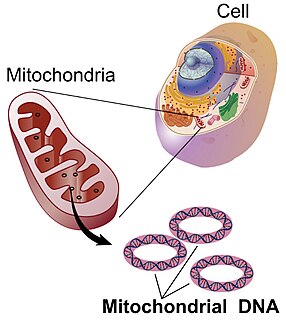
Mitochondrial DNA is the DNA located in mitochondria, cellular organelles within eukaryotic cells that convert chemical energy from food into a form that cells can use, adenosine triphosphate (ATP). Mitochondrial DNA is only a small portion of the DNA in a eukaryotic cell; most of the DNA can be found in the cell nucleus and, in plants and algae, also in plastids such as chloroplasts.
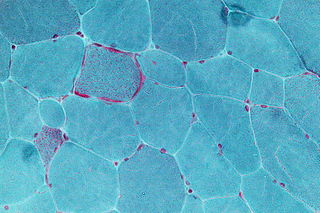
Mitochondrial disease is a group of disorders caused by mitochondrial dysfunction. Mitochondria are the organelles that generate energy for the cell and are found in every cell of the human body except red blood cells. They convert the energy of food molecules into the ATP that powers most cell functions.

River Out of Eden: A Darwinian View of Life is a 1995 popular science book by Richard Dawkins. The book is about Darwinian evolution and summarizes the topics covered in his earlier books, The Selfish Gene, The Extended Phenotype and The Blind Watchmaker. It is part of the Science Masters series and is Dawkins's shortest book. It is illustrated by Lalla Ward, Dawkins's wife. The book's name is derived from Genesis 2:10 relating to the Garden of Eden. The King James Version reads "And a river went out of Eden to water the garden; and from thence it was parted, and became into four heads."
The Royal Society Science Books Prize is an annual £25,000 prize awarded by the Royal Society to celebrate outstanding popular science books from around the world. It is open to authors of science books written for a non-specialist audience, and since it was established in 1988 has championed writers such as Stephen Hawking, Jared Diamond, Stephen Jay Gould and Bill Bryson. In 2015 The Guardian described the prize as "the most prestigious science book prize in Britain".
The Seven Daughters of Eve is a 2001 book by Bryan Sykes that presents the science of human mitochondrial genetics to a general audience. Sykes explains the principles of genetics and human evolution, the particularities of mitochondrial DNA, and analyses of ancient DNA to genetically link modern humans to prehistoric ancestors.

Anthony Clifford Grayling is a British philosopher and author. He was born in Northern Rhodesia and spent most of his childhood there and in Nyasaland. In 2011 he founded and became the first Master of New College of the Humanities, an independent undergraduate college in London. Until June 2011, he was Professor of Philosophy at Birkbeck, University of London, where he taught from 1991. He is also a supernumerary fellow of St Anne's College, Oxford where he formerly taught.
In genetics, paternal mtDNA transmission and paternal mtDNA inheritance refer to the incidence of mitochondrial DNA (mtDNA) being passed from a father to his offspring. Paternal mtDNA inheritance is observed in a small proportion of species; in general, mtDNA is passed unchanged from a mother to her offspring, making it an example of non-Mendelian inheritance. In contrast, mtDNA transmission from both parents occurs regularly in certain bivalves.
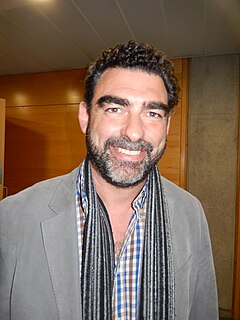
Nick Lane is a British biochemist and writer. He is a professor in evolutionary biochemistry at University College London. He has published four books to date which have won several awards.
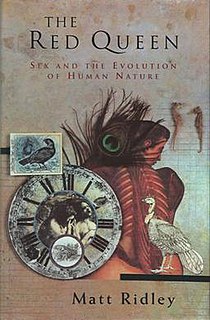
The Red Queen: Sex and the Evolution of Human Nature is a popular science book by Matt Ridley exploring the evolutionary psychology of sexual selection. The Red Queen was one of seven books shortlisted for the 1994 Rhône-Poulenc Prize, that was eventually won by Steve Jones' The Language of the Genes.

Gottfried Schatz was a Swiss-Austrian biochemist.
The CoRR hypothesis states that the location of genetic information in cytoplasmic organelles permits regulation of its expression by the reduction-oxidation ("redox") state of its gene products.
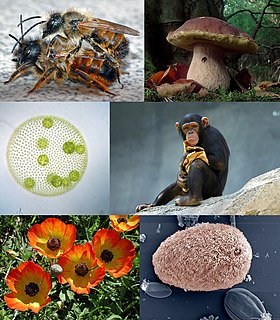
Eukaryotes are organisms whose cells have a nucleus enclosed within a nuclear envelope. Eukaryotes belong to the domain Eukaryota or Eukarya; their name comes from the Greek εὖ and κάρυον. The domain Eukaryota makes up one of the three domains of life; the prokaryotes Bacteria and Archaea make up the other two domains. The eukaryotes are usually now regarded as having emerged in the Archaea or as a sister of the now cultivated Asgard archaea. Eukaryotes represent a tiny minority of the number of organisms; however, due to their generally much larger size, their collective global biomass is estimated to be about equal to that of prokaryotes. Eukaryotes emerged approximately 2.1-1.6 billion years ago, during the Proterozoic eon, likely as flagellated phagotrophs.
The origin and function of meiosis are currently not well understood scientifically, and would provide fundamental insight into the evolution of sexual reproduction in eukaryotes. There is no current consensus among biologists on the questions of how sex in eukaryotes arose in evolution, what basic function sexual reproduction serves, and why it is maintained, given the basic two-fold cost of sex. It is clear that it evolved over 1.2 billion years ago, and that almost all species which are descendants of the original sexually reproducing species are still sexual reproducers, including plants, fungi, and animals.

The Evolution of Human Sexuality is a 1979 book about human sexuality by the anthropologist Donald Symons, in which the author discusses topics such as human sexual anatomy, ovulation, orgasm, homosexuality, sexual promiscuity, and rape, attempting to show how evolutionary concepts can be applied to humans. Symons argues that the female orgasm is not an adaptive trait and that women have the capacity for it only because orgasm is adaptive for men, and that differences between the sexual behavior of male and female homosexuals help to show underlying differences between male and female sexuality. In his view, homosexual men tend to be sexually promiscuous because of the tendency of men in general to desire sex with a large number of partners, a tendency that in heterosexual men is usually restrained by women's typical lack of interest in promiscuous sex. Symons also argues that rape can be explained in evolutionary terms and feminist claims that it is not sexually motivated are incorrect.

In biology, mother's curse is an evolutionary effect that males inherit deleterious mitochondrial genome (mtDNA) mutations from their mother, while those mutations are beneficial, neutral or less deleterious to females.

The Vital Question is a book by the English biochemist Nick Lane about the way the evolution and origin of life on Earth was constrained by the provision of energy.

John Allen is a British biochemist. He is an honorary professor at the Department of Genetics, Evolution and Environment at the University College London in the United Kingdom.
Anthony William Linnane (1930–2017) was an Australian professor of biochemistry, known for his work on mitochondria.














